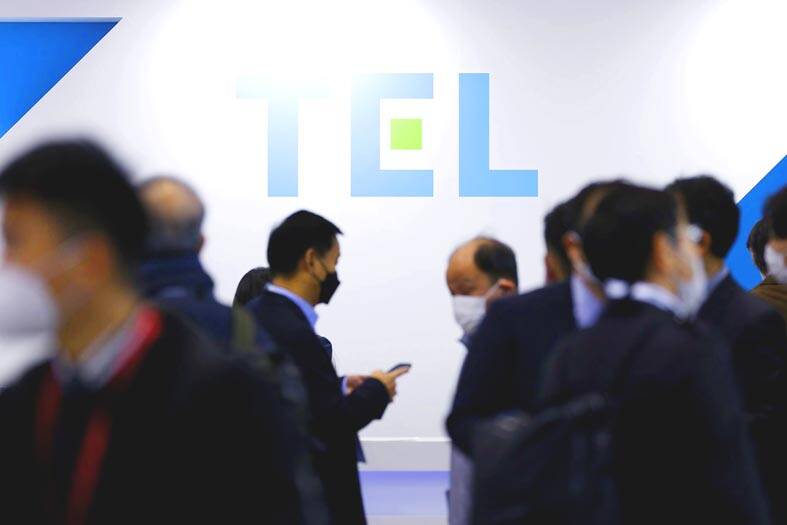Tokyo Electron Ltd yesterday said it has fired an employee at its Taiwan subsidiary over their alleged involvement in a trade secret leak at Taiwanese chipmaking giant Taiwan Semiconductor Manufacturing Co (TSMC, 台積電).
The Japanese firm issued a statement after media reports said Taiwanese authorities had searched its Hsinchu office as part of a probe into the breach.
Six people were arrested after TSMC discovered the leak involving “national core technology” last month, the High Prosecutors’ Office said this week.

Photo: Bloomberg
TSMC is the world’s largest contract chip manufacturer and counts Nvidia Corp and Apple Inc among its clients.
Taiwanese media have reported that the leaked information was related to TSMC’s most advanced 2-nanometer chip technology.
A former employee and two current TSMC staff members have been detained, while two other employees were released on bail and another freed without any conditions, prosecutors said.
The sacked Tokyo Electron staff member previously worked for TSMC and is among those detained, a source said.
Tokyo Electron is a major producer of chipmaking equipment used by TSMC, winning last year’s TSMC Excellent Performance Award for both “technology collaboration and production support.”
Another client is Japanese chipmaker Rapidus Corp, which is building a plant in Hokkaido to make 2-nanometer chips. Rapidus chairman Tetsuro Higashi was a former president of Tokyo Electron.
Tokyo Electron said it sacked its staff member after they were “confirmed to be involved in an incident announced by Taiwanese judicial authorities on August 5.”
“The company has terminated their employment and is fully cooperating with the investigation by Taiwanese judicial authorities,” Tokyo Electron said.
“An internal investigation has revealed no leaks of confidential information so far,” the company added.
In a statement, TSMC said it had taken “strict disciplinary actions against the personnel involved” in the “potential trade secret leaks.”
TSMC did not provide details about the technology involved in the suspected leaks.

South Korea’s equity benchmark yesterday crossed a new milestone just a month after surpassing the once-unthinkable 5,000 mark as surging global memory demand powers the country’s biggest chipmakers. The KOSPI advanced as much as 2.6 percent to a record 6,123, with Samsung Electronics Co and SK Hynix Inc each gaining more than 2 percent. With the benchmark now up 45 percent this year, South Korea’s stock market capitalization has also moved past France’s, following last month’s overtaking of Germany’s. Long overlooked by foreign funds, despite being undervalued, South Korean stocks have now emerged as clear winners in the global market. The so-called “artificial intelligence

‘SEISMIC SHIFT’: The researcher forecast there would be about 1.1 billion mobile shipments this year, down from 1.26 billion the prior year and erasing years of gains The global smartphone market is expected to contract 12.9 percent this year due to the unprecedented memorychip shortage, marking “a crisis like no other,” researcher International Data Corp (IDC) said. The new forecast, a dramatic revision down from earlier estimates, gives the latest accounting of the ongoing memory crunch that is affecting every corner of the electronics industry. The demand for advanced memory to power artificial intelligence (AI) tasks has drained global supply until well into next year and jeopardizes the business model of many smartphone makers. IDC forecast about 1.1 billion mobile shipments this year, down from 1.26 billion the prior

People stand in a Pokemon store in Tokyo on Thursday. One of the world highest-grossing franchises is celebrated its 30th anniversary yesterday.

Chinese artificial intelligence (AI) start-up DeepSeek’s (深度求索) latest AI model, set to be released as soon as next week, was trained on Nvidia Corp’s most advanced AI chip, the Blackwell, a senior official of US President Donald Trump’s administration said on Monday, in what could represent a violation of US export controls. The US believes DeepSeek will remove the technical indicators that might reveal its use of American AI chips, the official said, adding that the Blackwells are likely clustered at its data center in Inner Mongolia, an autonomous region of China. The person declined to say how the US government received